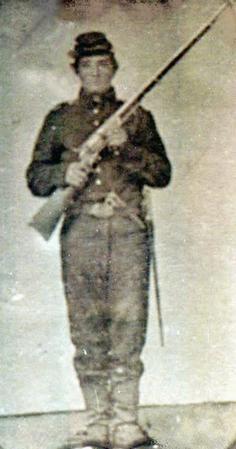Abel Payne

Abel Wade Payne Abel Wade Payne was born in June 1841 in Vermilion County, Illinois. On April 24, 1861, when he was 20 years old, he enlisted into Company C, 12th Regiment Illinois Volunteer Infantry. Since this was a 3-month regiment, he, along with the rest of his regiment, was mustered out of service on August 1, 1861. On August 15, 1861, he then enlisted in Company K, 37th Regiment Illinois Volunteer Infantry (a 3-year regiment). Abel was in the Battle of Fort Donelson in February 1862, and he was wounded during the Battle of Pea Ridge in March 1862. He was discharged on March 1862 as a result of the injury. He reenlisted on July 14, 1862 into Company A, 70th Regiment Illinois Volunteer Infantry and served until he was mustered out on October 23, 1862 (this regiment also was a 3-month regiment). Finally, he enlisted on February 20, 1863 in Company L, 16th Regiment Illinois Volunteer Cavalry (a 3-year regiment). A portion of the 16th Illinois served as the bodyguard for Major General John Alexander McClernand. In January 1864, Corporal Payne was captured in Jonesville, Virginia and sent to Andersonville Prison in Georgia. According to family legend, he escaped Andersonville by digging his way out. He continued to serve with his regiment until June 24, 1865 when the entire regiment was mustered out of service at Camp Case, Ohio. The Payne family was a prominent military family in their place and time. Abel had two brothers, William and Alonzo, one uncle, Captain Morgan Lewis Payne, and one first cousin, Asa, who also served in the Civil War.
After the war, Abel Payne returned to Vermilion County, Illinois, where he first worked in coal mines. He later became Justice of the Peace in Newell Township in Vermilion County and he taught school. He was married twice and had one child from his first marriage, Thomas Louis Payne (1872-1947). Abel Wade Payne died on March 8, 1923 in Vermilion County, Illinois.
Several years after the Civil War, he wrote a poem, entitled The Roll Call of Heaven.
Through four long years of cruel war
We fought for freedom's right,
The sun of chattle slavery
Went down in endless night,
And many thousand soldier boys
They fell but not in vain:
For they called the roll of Heaven
And they answered to their names.And there's our martyred President,
Honest Abraham;
He died on freedom's altar
For the sacred rights of men.
And never will we see his like
Upon this earth again;
For they called the roll of Heaven
And he answered to his name.And there's our noble Farragut,
Way down in Mobile bay;
He led his fleets against the forts,
We know he gained the day.
A braver man we will never see
On the quarter-deck again;
For they called the roll of Heaven,
And he answered to his name.And there is Meade and Hancock
And old Pap Thomas, too,
Have received their final order
To join the grand review.
And never will Kilpatrick hear
That bugle call again,
For they called the roll of Heaven
And they answered to their names.And there is George A. Custer, too,
Michigan's favorite son,
He wore the rank of General,
So proudly he had won.
But at the little Big-Horn river,
Upon that battle plain,
They called the roll of Heaven,
And he answered to his name.There's fighting Josie Hooker,
His heart is cold and still;
He led the Union army
O're disastrous Chancellorsville.
But above the clouds at Lookout,
He won immortal fame;
But they called the roll of Heaven,
And he answered to his name.And there's our noble Garfield,
We'll remember him for years,
For there beside his bedside
Stood a nation bowed in tears.
For eighty days he lingered,
Through all that fearful pain,
Then they called the roll of Heaven,
And he answered to his name.And there is Grant, that silent man,
Lies slumbering in the grave.
He did all that any man could do,
Our Union for to save.
But up at Mount McGregor,
Near Saratoga's plain,
They called the roll of Heaven,
And he answered to his name.
And there is John A. Logan,
Illinois' bravest son,
Who was all crowned o'er with glory
For the victories he had won.
Our brave commander's gone, boys,
We'll n'er see him again,
For they called the roll of Heaven,
And he answered to his name.And now, my dear old soldier friends,
My song to you is done;
The boys in blue are passing off
Daily one by one.
And when we're camped beneath our flag
upon that judgment plain,
They will call the roll of Heaven,
And we'll answer to our namesPhotograph and information submitted by Abel Wade Payne's great-grandniece, Alice Marie Beard.
Abel Wade Payne


